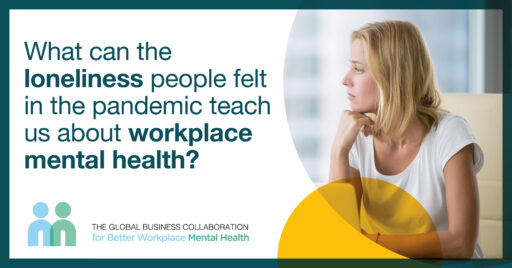This website uses cookies so that we can provide you with the best user experience possible. Cookie information is stored in your browser and performs functions such as recognising you when you return to our website and helping our team to understand which sections of the website you find most interesting and useful.
What can the loneliness people felt in the pandemic teach us about workplace mental health?
As we move through a global shift of hybrid working being the norm, it’s important that we reflect on the impact that the pandemic has had on people, the effect it is still having on employees and what this can teach us about workplace mental health. This week it’s European Mental Health Week and in the UK for Mental Health Awareness Week the theme is loneliness. So what have we learnt about the effects of loneliness throughout the pandemic and what can businesses around the world do to prioritise employee wellbeing?

Throughout the pandemic remote working was the safest and best option for many, but coupled with the important need for social isolation, many struggled with loneliness. A recent study from the World Health Organization shows that there was a 25% increase in depression and anxiety during the pandemic, with loneliness marked as one of the stressors contributing to this. This tells us that loneliness is a crucial factor to consider when ensuring team members feel connected and supported.
“Anyone who has suffered with mental health problems will tell you how alone they feel. This must change. We as leaders must speak out so others don’t have to suffer in silence. We need to ensure that support and treatment is readily available. Training colleagues to spot the signs of distress, helplines and tools to help the healthy stay health.” – HSBC Surendra Rosha
The Time to Act report from Bupa and City Mental Health Alliance shows that young professionals have been particularly affected. According to the report, 69% of 20–26-year-old employees experienced loneliness due to covid-19 & lockdowns, with 9 in 10 saying that employers have a responsibility to support the positive mental health and wellbeing of their people.
The pandemic shone a spotlight on employee wellbeing, with many employers stepping up their support and taking action to ensure that workplace mental health was a priority. The Time to Act report affirms that this proactive approach to wellbeing is still, and will continue to be a necessity. It tells us that employees are counting on employers to foster positive workplace environments and lead the way in maintaining a supportive culture around mental health.
Maintaining momentum on workplace mental health isn’t always easy. It can be challenging to know how to show employees that wellbeing is a priority. Our community consists of a range of businesses and what we’ve learnt is that sometimes for smaller organization’s Employee Assistance Programmes aren’t possible – and that’s okay. Employee mental health support can be tailored to your team’s needs, without spending a big budget, such as wellbeing resources, training for staff and regular check-ins. What is vital is that employers show they are taking responsibility for ensuring the team feel supported, without employees needing to speak out about the challenges they’re facing.
Are you working to tackle loneliness and improving employee wellbeing in your organisation? Sign our leadership pledge today to join our community of business leaders committed to employee wellbeing. Our leadership pledge has 6 clear areas of focus to help you work towards better workplace mental health, once you’re signed up you will receive an onboarding pack to get you started.
Learn more about our leadership pledge
